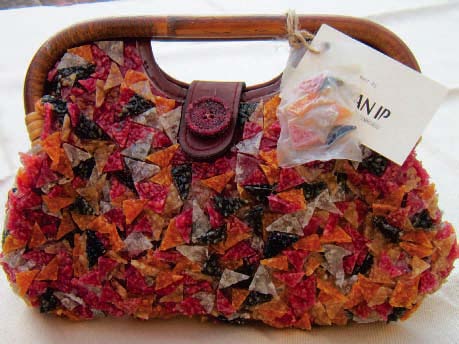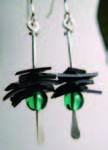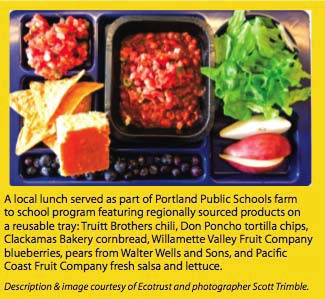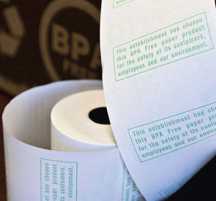London-based Hoyan Ip, a 2012 MA Fashion graduate, observed that food waste could help offset fashion industry waste. So, she set about using discarded food to make buttons, buckles, and other garment trims. Ip says, “Fashion represents change. Bio-trimmings are unique products that act as an object to educate and make good changes towards both sustainable fashion and ethical living for the future.”
-
-
Astute ‘Adoornment’
Cabinet Doors Become Artist’s Canvas Bright colors, a love of nature, a sense of delight, and a practiced hand all contribute to the look and feel of Elizabeth See’s oil paintings. At first glance, her work appears to be rendered on traditional materials. Closer examination will reveal that she uses discarded cabinet doors and cut-offs from woodworking production as the canvas for her art. The BZ Corner, WA artist takes repurposing seriously and is constantly on the hunt for scrap wood and disused cabinetry. It is as natural for her to befriend nature by keeping usable materials from the landfill as it is for her to sit quietly studying the…
-
Inner (tube) Beauty
Artful Accessories from Recycled Bicycle Inner Tubes When Julia Garretson looks at bicycle inner tubes, she sees jewelry. When others look at her jewelry, they see- well… Jewelry. As a member of Portland’s Trillium Artisan Etsy Team, Julia is one of several local artisans dedicated to using recycled materials in her work. The end result is a wonderful collection of handmade paper and jewelry that she markets locally as well as online. Having grown up in Massachusetts, the clever craftswoman brought her passion for making things with her hands to Portland. Here, she graduated from Oregon College of Art and Craft with a degree in metalsmithing. The talented artist forges,…
-
Farm to School
The ABCs of Fresh Food An innovative effort to bring locally-grown foods to Oregon’s school children and to help them understand where their food comes from received a big thumbs-up when the Oregon State Legislature unanimously passed House Bill 2800 in July. HB 2800, aslo known as the “Farm to School and School Gardens” bill provides $200,000 to a pilot program to rev up the provision of Oregon-grown foods and hands-on, garden-based education to public school students. The funds will allow school districts an extra 15-cents per school meal to buy Oregon foods and produce. This is good news for small farmers whose livelihoods depend upon locavore consumption and for…
-
Sustainable Schools-Sustainable Solutions
The Zero Waste Alliance’s Sustainable Oregon Schools Initiative, SOSI (pronounced “so see”) has taken a systemic approach to fostering healthy school environments by engaging, educating and inspiring individual schools, districts, and the organizations that support them. Oregon’s schools comprise an infrastructure large enough to house one-fifth of Oregon’s population and that means they have a large carbon footprint. Reducing that footprint will result in a cleaner environment, but will also save money by eliminating waste and increasing resource efficiency. But creating a healthy, sustainable environment is only part of the sustainability solution. Through education for sustainability, SOSI helps to develop school curriculums infused with learning that prepares students to live…
-
Skin is No Obstacle for BPA
Bisphenol-A, also known as BPA, is an industrial chemical component of many widely-used items including plastics, resins, canned food linings, and paper goods. Studies have suggested that long-term or high-dose exposure to the organic, estrogen-like compound disrupts the body’s endocrine system and may be linked to cancer, heart disease, intestinal damage, reproductive problems, erectile dysfunction, diabetes, obesity, impaired neurodevelopment, and behavioral changes in children. BPA is a part of a thermal paper coating that acts as a color developer in small credit card and cash register receipt printers. According to a CBS news report, some receipts contain up to1,000 times the levels found in a can of food. Needless to…
-
Purple Wind Turbines May Be Less Likely to Harm Birds
Researchers Chloe Long, Dr. James Flint, and Dr. Paul Lepper, all colleagues at the Loughborough University in the United Kingdom, conducted experiments to learn whether color might play a role in attracting insects to wind turbines. They measured how many insects were attracted to different colored cards laid out in random order next to a 43-foot-tall three-blade wind turbine. The experiments showed that insects are most attracted to yellow followed by white and light gray. The researchers discovered that the color least attractive to insects was purple and reasoned that wind turbines painted purple would likely kill fewer birds and bats: Birds and bats are often hit when…
-
The RINSE Project Helps Wineries Reuse Wine Bottles
Cowhorn Winery in Applegate Valley, Oregon has teamed up with Wine Bottle Renew to establish a powerful new bioregional program called ‘The RINSE Project.’ The project cuts per-bottle costs and reduces wineries’ carbon footprints by recycling used wine bottles and preparing them for industry reuse. Some 300 million cases of wine are sold in the United States each year and the wine bottles from about 210 million end up in landfills. As the first Southern Oregon winery to ship used bottles through the RINSE Project, Cowhorn Winery aims to help change that and cut its carbon footprint in the bargain. In addition to cleaning, packing, and shipping wine bottles for…
-
Fiber Cells + Pokeberries = Solar Power
Here’s an exciting article by Alicia W. Roberts, Wake Forest University and posted on RenewableEnergyWorld.com website. Seems Wake Forest University holds the first patent for fiber-based photovoltaic, or solar cells, granted by the European Patent Office in November. A spinoff company called FiberCell Inc. has received the license to develop manufacturing methods for the new solar cell. And now the scientists at the University’s Center for Nanotechnology and Molecular Materials have used the red dye made from pokeberries to coat their efficient and inexpensive fiber-based solar cells. The dye acts as an absorber, helping the cell’s tiny fibers trap more sunlight to convert into power. These low cost fiber cells…
-
SoupCycle Delivers Organic Soup-Based Meals Made from Locally Sourced Foods
A several years ago, a couple of college students made a business plan to make and sell locavore soup and deliver it by bicycle. The students came to Portland and set up their business, SoupCycle. Jed Lazar and Shauna Lambert are the creative cooks and bicycle peddlers behind the food service business. They source local produce whenever possible and actively pursue environmentally sustainable, socially responsible business practices. They do have help with deliveries from fellow SoupCyclers Jen and Matt and they’re avid bicycle advocates twittering support for bike events and get-togethers. Soups and soup meals are available by subscription. Ordering online is easy and both the soup…





